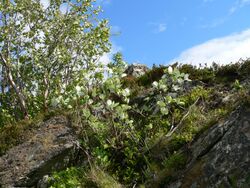Biology:Sorbus rupicola
| Sorbus rupicola | |
|---|---|

| |
| Rock whitebeam at the Trondheimsfjord, Norway | |
| Scientific classification | |
| Kingdom: | Plantae |
| Clade: | Tracheophytes |
| Clade: | Angiosperms |
| Clade: | Eudicots |
| Clade: | Rosids |
| Order: | Rosales |
| Family: | Rosaceae |
| Genus: | Sorbus |
| Subgenus: | Sorbus subg. Aria |
| Species: | S. rupicola
|
| Binomial name | |
| Sorbus rupicola (Syme) Hedl.
| |
Sorbus rupicola, known as rock whitebeam,[1] is a rare shrub or small tree best known from the British Isles but also reported from Norway , Sweden and Russia .[2]
Reaching heights of 10 m,[3] it grows in rocky woodland, scrub and cliffs, usually on limestone.[3]
The species reproduces apomictically (asexually via cloned seeds) and was presumably created by autopolyploidysation of the common whitebeam proper (Sorbus aria s.str.). It contains a tetraploidal set of chromosomes (2n=4x=68).
Sorbus rupicola is a member of Sorbus aria agg., which contains 20 subspecies. A key to this aggregate is given in Stace - though be warned Stace states "It is probably impossible to construct a reliable key to the agg."![3] Stace gives Sorbus rupicola the following characteristics:
- Leaves unlobed or lobed ≤1/20 of the way to the midrib.
- Leaves with a single style of teeth or, weakly, two styles of teeth.
- Leaves with 6 to 9 (rarely 4 to 10) pairs of lateral veins.
- Leaves mostly 1.6 to 2.4 times longer than wide.
- Leaves mostly widest in that half of the leaf furthest from the stalk.
- Leaves usually obtuse (rarely acute) at apex.
- Leaves have dense white hairs on lower surface.
- Fruits 10-15mm across, warty.
References
- ↑ (xls) BSBI List 2007, Botanical Society of Britain and Ireland, https://bsbi.org/download/3542/, retrieved 2014-10-17
- ↑ "Ecological flora of the British Isles: Sorbus rupicola". http://www.ecoflora.co.uk/search_species2.php?plant_no=800280070. Retrieved 2010-07-17.
- ↑ 3.0 3.1 3.2 New Flora of the British Isles; Clive Stace; Third edition; 2011 printing
Further reading
- Ennos, R. A.; G. C. French; P. M. Hollingsworth (2005). "Conserving taxonomic complexity". Trends in Ecology and Evolution 20 (4): 164–168. doi:10.1016/j.tree.2005.01.012. PMID 16701363.
- Robertson, A.; A. C. Newton; R. A. Ennos (2004). "Multiple hybrid origins, genetic diversity and population genetic structure of two endemic Sorbus taxa on the Isle of Arran, Scotland". Molecular Ecology 13 (1): 123–134. doi:10.1046/j.1365-294X.2003.02025.x. PMID 14653794.
External links
- Distribution map of S. rupicola. Naturhistoriska riksmuseet.
Wikidata ☰ Q1335724 entry






